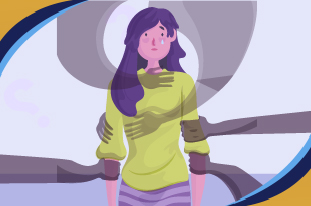Sometimes, people who are very sad and have major depression also experience a special kind of problem called catatonia.
This is what doctors call catatonic depression. It is a condition where someone has trouble moving and talking, even when they want to.
Catatonic state meaning shows when the body and mind are stuck in slow motion. People with catatonic depression may not respond to you, or they may hold their bodies in a strange position for a long time. It can look like they are frozen. They might not speak at all, or might just repeat what others say.
This is a very serious type of depression that makes it hard for a person to do simple things like eating, dressing, or even getting out of bed.
The good news is that help is available. With proper and quick care, people with catatonic depression can get better and feel like themselves again.
What does Catatonic Depression look like?
People who have catatonic depression might act in a mix of ways. They can feel very sad and also have problems with how their body moves. These signs can start little by little or all at once.
- Stupor: A person with catatonic depression symptoms might seem like they are in a daze. They don’t move or talk much and barely react to what’s happening around them.
- Mutism: This is when a person cannot or will not talk. They might speak only a few words or not say anything at all.
- Immobility: This means someone is barely moving. They are very still and do not react to things as much as you’d expect.
- Rigidity: The person holds their body in a stiff way, and it’s hard to move their arms or legs. It’s like their muscles are tight and won’t relax.
- Posturing: This is when someone stays in a strange or uncomfortable position for a long time. It’s like they are statues.
- Impulsivity: A person might suddenly do something out of the blue, like run or yell, without any clear reason.
Read More: ADHD vs Depression: Finding The Link Between Them
What Causes Catatonic Depression?
Catatonic depression is a serious mental health condition where people have very little or no movement, or sometimes a lot of unusual movement. It’s a complex condition, and researchers are still learning exactly causes of catatonia. There are believed to be a few things that seem to play a role.
Brain Chemicals and Signals
The human brain is like a big city with many roads and signals. The roads are brain pathways, and the signals are chemicals called neurotransmitters. For someone with catatonic depression, some of these signals and roads aren’t working right.
- GABA: This brain chemical is like a calm-down signal. When there isn’t enough of it, the brain can get overexcited, which might lead to catatonia. Medicines like benzodiazepines, which help calm the brain, are often used to treat it.
- Dopamine: This chemical helps with movement and feelings of pleasure. If there’s not enough of it, or if it’s out of balance with other chemicals, it could cause some of the symptoms of catatonia and depression.
- Glutamate: This is an “on” signal for your brain. If there’s too much of it, it can make some parts of the brain too active. This could be another reason why catatonia happens.
Read More: Coping Mechanisms For Depression: Practical Strategies To Help You Navigate
Genes and Family History
Sometimes, certain conditions run in families. Psychiatrists may find that if a close family member has catatonia, you have a higher chance of developing it yourself. This suggests that some people are born with genes that make them more likely to get the condition.
Brain Pathways
Your brain has special pathways that control movement. For people with catatonia, these pathways might not work as they should. The reason is that blood flow to certain parts of the brain that control movement is different in people with catatonia.
Stress and Past Experiences
Difficult or stressful events in a person’s life can also play a role. Extreme stress, especially if it happens when you are young, is linked to mood disorders. For some people, catatonia may be a kind of final reaction to feeling completely overwhelmed or scared.
Immune System
Your immune system protects you from getting sick. But sometimes, it can be confusing and attack your own brain. When this happens, it can cause brain swelling and other problems that lead to catatonia.
If you or a loved one is experiencing symptoms of catatonic depression, it is important to get help from professional psychiatrists or medical practitioners.

How To Find Out What’s Happening
First, health practitioners and psychiatrists do a full check-up. They ask about your health history and any medicines you take. They also do a physical exam to look at your body’s movements and posture. This helps them rule out other health problems that can look like catatonic depression, such as certain brain conditions or reactions to medicines.
Bush-Francis Catatonia Rating Scale
There is a special list to decide if a person has signs of catatonia. It’s like a checklist with 12 signs. If someone has at least three of these signs, it helps psychiatrists to make a diagnosis. They also use a special tool called the Bush-Francis Catatonia Rating Scale. It is a detailed score sheet. It has 23 questions, and professionals use it to see how many symptoms are present and how serious they are. This helps them understand the problem and see if the treatment is working or not.
Looking Deeper with Tests
While there’s no single lab test for catatonia, psychiatrists may suggest some tests to get a better picture of your health. This could include blood tests, a look at your brain waves with an EEG, or even a brain scan like an MRI. These tests help them look for any other medical issues that might be a part of what’s happening. For example, sometimes a problem with the brain’s signals can cause these symptoms, and they can be found with specific tests.
Read More: Major Depressive Disorder In Children: A Guide For Parents
Treatment Approach for Catatonia
When it comes to treating catatonia, there is a very clear plan. The most common and effective first step is to use a type of medicine called a benzodiazepine.
Why Use This Medicine
Psychiatrists often use a medicine called lorazepam. It’s the top choice because it works really well for most people with catatonia. In fact, many people feel much better after taking it. It can help calm the body’s movements and reduce the other symptoms of catatonia.
To make sure this medicine is the right choice, psychiatrists sometimes do a special test called a “lorazepam challenge.” They give a small amount of the medicine and then watch closely to see if the symptoms get better quickly. If they do, it confirms the diagnosis and shows them that this treatment will likely be very helpful.
Other Treatment Approaches
After a diagnosis of depression catatonia, the next step is to create a plan to help you feel better.
Medications
Psychiatrists are careful with some other types of medicines. For example, they usually avoid certain antipsychotic medications because these can sometimes make catatonia worse. However, if a person has another condition like schizophrenia, they might consider a different type of antipsychotic medicine later, once the catatonia symptoms have improved.
Psychotherapy to help Your Body and Mind
It is a big part of treatment to keep your body healthy. If you can’t move much or eat, psychiatrists will make sure you get the nutrition and fluids you need. They also pay close attention to your body to prevent problems that can happen from staying still too long.
Experts believe in a whole-person approach. This means they help you create a daily routine that includes things like regular sleep, meals, and activities. Simple things like walking or doing yoga can also help lift your mood. They also offer psychotherapy, which is a special type of talk therapy. It helps you learn ways to cope with your feelings and develop strategies to manage your symptoms.
What to Expect for the Future
The good news is that catatonic depression is treatable. Most people who receive early and consistent treatment have a great chance of getting better. While the physical symptoms of catatonia may go away quickly, it’s important to remember that the underlying depression may need long-term care.
Read More: A Guide To Understand Catatonic Schizophrenia
How can we help?
When it comes to catatonia depression treatment , we at Orange Coast Psychiatry take a very careful approach. Our goal is to figure out exactly what’s going on so we can help you feel better as soon as possible. We use different methods like psychotherapy and telehealth for easy and quick accessibility.
Early recognition and treatment at the start of the catatonic state is necessary for the best results.


















